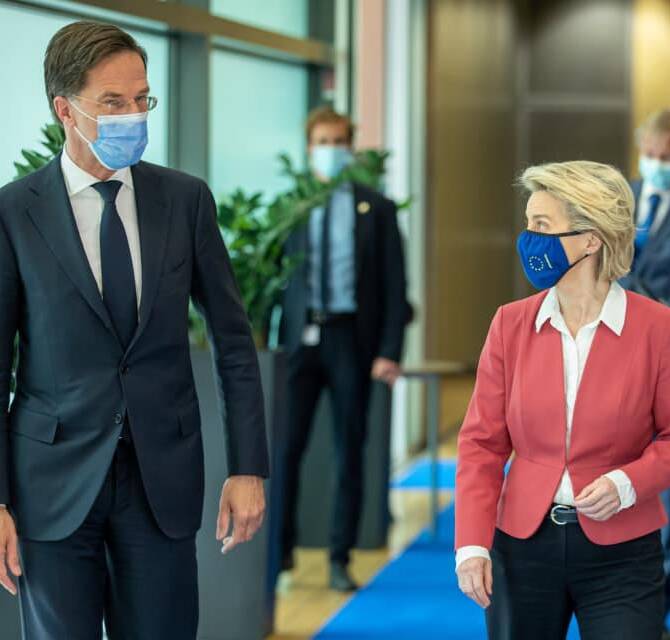This article was published online by the Magyar Nemzet on 27 March 2022.
“Not only did the Hungarian people work hard for this money, but they are also setting an example for all of Europe by helping those in need. I believe that the Von der Leyen Commission stands at a moral crossroads now,” said Judit Varga in her interview with Magyar Nemzet in connection with the Hungarian government’s request for access to the EU recovery program loans allocated to them. The Justice Minister also explained that on April 3rd, the Hungarian elections will not only decide our nation’s government, peace and security policy, but also the future of the continent. “We in Hungary would like to show that there is hope for a future that is Christian, values families, and opposes illegal migration,” said the Minister, who we spoke with after the General Affairs Council this week in Brussels.
Many EU politicians praise Hungary’s humanitarian efforts in the wake of the Ukrainian war. Did you notice this change of tone at the council meeting?
We have indeed grown unaccustomed to words of praise lately. Now, however, we began with numerous colleagues praising the countries at the front for the aid provided, including Hungary. Our efforts are recognized by the international community, so the next step would be to suspend the ideological debates that are withholding the loans from the recovery funds. It has become unacceptable for the European Commission to ignore the effects of the war on the countries at the front.
Prime Minister Viktor Orbán wrote a letter to Commission President Ursula von der Leyen requesting approval for the Hungarian recovery funds as soon as possible. Were there any reactions to this from the European Ministers?
The process of the Council formation is more rigid; I think this letter was a surprise to many colleagues. Not to mention that we sent this to the Commission, and not the Council, which represents the Member States. The point is: the Hungarian recovery program must be accepted as soon as possible. We are now seizing the opportunity to draw these loans as Hungary has been extraordinarily burdened by this war. We have accepted and fully provided for over half a million refugees – and this number will only grow. We expect flexibility from the Commision; they must make EU resources available to finance the reception and care of refugees. All this of course does not mean that we will take apart the recovery fund, but we must address this extraordinary situation. Emergencies require emergency measures. It would be emblematic if the European Commission were to give a positive answer – after all, not only did the Hungarian people work hard for this money, but they are also setting an example for all of Europe by helping those in need. I believe that the Von der Leyen Commission stands at a moral crossroads.
“The time is now to put an end to the ideological attacks and political revenge – we are facing a real war. Brussels must support Member States, not attack them.”
Was it planned to write this letter to the European Commission together with the Poles? Warsaw’s recovery funds are also awaiting approval. Many presume that the Russian-Ukrainian war has inhibited Hungarian-Polish connections.
This is an extraordinary situation. Aside from helping Ukraine, everyone is busy with their own problems; managing the refugee crisis requires a truly enormous level of coordination. I believe that considering the current circumstances, it does not matter if we turned to the Commission together or not. I am sure that the Poles have a similar opinion on the recovery funds. And it is no secret that a strong united Visegrad alliance was not in the interest of some. There is a Central European formation representing the interests of 60 million citizens, cooperating regardless of the government. Polish-Hungarian friendship stretches back for centuries – it is no coincidence that we consistently defend each other in the rule of law debates. Inhibiting this cooperation is an outside interest. I encourage everyone to reject the fake news on this.
We always openly and honestly discussed areas that we did not fully agree on. Our Polish partners are aware that we are dependent in regard to fossil fuels. In the past ten years we have worked hard to diversify our energy supply, yet as is also known in Warsaw, we cannot alter our regional or geographic situation overnight.
Note the Nabucco project which would have delivered natural gas from the Turkish-Bulgarian border to the West – it was not due to us that this did not happen. I find it unheeded that some of the differences in the V4 are presented as novelty and the end of the Hungarian-Polish friendship.
Next week Hungarian voters will also be deciding on the child protection law. According to the government, the European Commission has not approved the Hungarian recovery plan because of this law. If, after all, we can access funds because of the war, will the referendum become obsolete?
No! There is a very obvious trend in Western Europe of exposing our children to LGBTQ propaganda as early as preschool or elementary school ages. Essentially, they want to take away the rights of parents to raise their own children. There may not be a more dangerous threat justifying the need for the government to ask the Hungarian people’s definitive opinion. There are still many battles ahead of us in this territory. And Brussels must respect the Hungarian perspective. Moreover, not only will we be deciding on our nation’s government, peace and security policy in the upcoming elections, but also on protecting our children. The left clearly stated that they would repeal the child protection law, thereby clearing the way for LGBTQ propaganda here just as in many other countries. The recovery funds were ideologized, for ideological reasons, by the European Commission after the child protection law was passed. Now we are also involved in a wartime situation. This, in my opinion, provides a moral advantage for the Hungarians. Now it is even more important to take part in the referendum. The government would like to continue negotiations on the recovery loans with a strengthened position. In connection with the 2016 migration referendum, we got a very strong mandate to represent our standpoint in Brussels. Life has clearly confirmed this belief: in the recent past we have seen more and more EU countries build fences at their borders and advocate for the strongest possible protection of our borders. What’s more, during the migration crisis, we were unfoundedly accused of breaking asylum rules. Now we are proving ourselves again: in wartime, we are the first safe country and accepting refugees accordingly.
Tempers are hot in the EU concerning next week’s parliamentary elections and their results.
Because the Hungarians are deciding on the future of Europe as well! The values that we have been representing in European politics for many, many years are still valid now, during this war. Our government believes in the concept of a strong Europe made of strong nations. The right has repeatedly lost out in Western Europe. Just look at the European People’s Party for example: the party family has lost its governing ability in most countries as it has shifted to the left. Tens of millions of Europeans are without representation on the right. We in Hungary would like to show that there is hope for a future that is Christian, values families, and opposes illegal migration. We want to encourage Western European and other countries’ political forces with the same or similar ideologies to be courageous. The liberal progression seeking to question nations and families and melt everything together cannot be the future of our continent. Our position on this is firm. The opportunity for Hungarians to set an example for Europe is in front of us again.
“On April 3rd, voters will not only be deciding on the makeup of the Hungarian government, but on the future of our country and our continent.”
According to recent studies, many voters see the government as patriotic but not pro-Europe. Does this fit into what you have outlined?
We have enlightened partnerships with our European allies. This is the basis of EU and NATO membership. Thus far, we have accepted all sanctions passed by the community, even if we had reservations. But we upheld European unity. It is an open secret that there are red lines concerning national sovereignty; we must decidedly stand out against any masked attempts to expand spheres of influence. We also repeatedly express that it is in our interest that the European Union be prosperous and respectful towards each other. We dare to ask, we refuse to give up our strategic and national interests – but this does not make us anti-European. Let us also address the studies that clearly show that the Hungarian population is dedicated to integration. The only novelty of the Hungarian government’s European policy is that, as a Central European state, we assume the primacy of these economic and national interests. Those in the West and EU institutions are not used to this, but rather that the small ones follow the interests of the “big” powers.
Rule of law files were also on the agenda for Tuesday’s meeting, but the latest updates reveal that the European Commission is not prioritizing the implementation of the rule of law mechanism. Do you have an idea of how long this rule of law debate can be shelved due to the war?
I have no illusions – but I am sure that the preparations for Thursday’s European Council have been a priority for this meeting. There is war in Europe with consequences that impact our economies, but especially the countries at the front as they handle the migrant crisis. It would have been a complete waste of time to deal with rule of law now.
“Despite this, I am sure that this question will not be entirely erased from the agenda as the ideological pressure that is generating this debate is still present in EU institutions.”
Just look at the frustrated statements recently from certain representatives of the European Parliament. The Polish have taken in over two million refugees and Hungary over half a million. The European Commission must deal with these truly grave issues now, not a witch hunt. From a diplomatic perspective, it would be worrying if they started going after Member States full steam ahead in accordance with the European Parliament’s political-ideological pressure.
Tamara Judi




